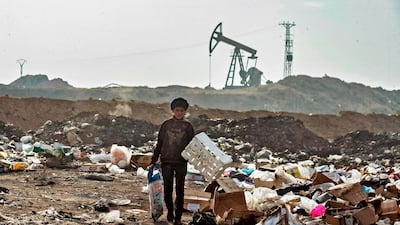Twenty-twenty was a year unlike any other in our lifetimes. The dramatic impacts that Covid-19 had on the global energy system – including oil prices in the US going negative for the first time – were a side note, however, compared to the larger stories of suffering and death, economic upheaval and the singular scientific achievement of developing multiple highly effective vaccines in under a year.
Nonetheless, it is quite possible that the energy system will emerge from the Covid-19 crisis indelibly altered – changes that could be seen by future generations as some of the most consequential of the pandemic, if policymakers act on the opportunities at hand.
In late 2020, the Atlantic Council’s Global Energy Centre surveyed a group of senior energy leaders from around the world to better understand how Covid-19 was changing the energy system. The results were telling, and they give hope that the world might yet address climate change. Sixty-one per cent of respondents believe that the pandemic will accelerate the energy transition, while only 20 per cent thought it would impede it. However, the respondents also set a task for global leaders: to make good on the opportunity of green recovery. Survey respondents think that political will and policy are the biggest impediments to reaching net-zero greenhouse gas emissions by 2050. The consensus is that the most uncertain pathways and hardest choices are still to come.

Two figures from the survey demonstrate the difficulty ahead. First, we asked when or if global oil demand will peak, and 43 per cent of those surveyed responded that peak oil demand has already occurred or that it will occur within the next five years; 46 per cent forecast that it will occur late this decade or sometime in the next one.
While we do not have survey data from last year to compare, we believe these responses are markedly different than they would have before the pandemic, and that the average predicted timeline for a peak in oil demand was far sooner in 2020 than it would have been in 2019. Numerous articles were published in 2020 – like one from Bloomberg called "Peak oil is suddenly upon us" – that both reflected and impacted the zeitgeist.
Second, we asked respondents the likelihood of achieving net-zero emissions by 2050. Only 30 per cent think it is somewhat likely, and just six per cent consider it very likely or certain.
That 89 per cent of respondents think oil demand will peak by 2040 – a true accomplishment, given that global oil demand grew by about 88 per cent between 1971 and 2019 – and yet only 36 per cent think we are likely or somewhat likely to reach net-zero emissions by 2050, illustrates the scope of the challenge.
From a technical perspective, this is obvious: oil is only one source of emissions, and reductions must be realised across many sectors. The survey data suggests that, while energy leaders are optimistic about stopping the growth of and perhaps reversing emissions from the production and consumption of oil, they are less optimistic about other emissions. In this vein, only 11 per cent believe that consensus will be reached on carbon-trading rules at the United Nations Climate Change Conference this year, despite 94 per cent stating that doing so is important to prevent a rise in average temperature of over 2°C. Perhaps most telling, 19 per cent of government respondents say such consensus will never be reached.
This is why it is up to policymakers to make good on the opportunities that have emerged from the tragedy of Covid-19. Spurred by the need to rebuild their economies, many global leaders see a chance to address climate change through “green stimulus” plans and net-zero pledges. With the pandemic raging and unemployment at near-record highs, one easily could have imagined that climate change would have yet again been put on the backburner, a long-term problem that could be addressed only after the crisis at hand was resolved. But following a year of record wildfires, hurricanes and extreme heat, many leaders see an opportunity to address both the economic and climate crises together.
It is hard to imagine a stronger global alignment of political will to act on climate change – and, crucially, to spend on climate action – than we have right now. 2021 will be the year we see if leaders start to make good on their promises and if the global community can meaningfully address climate change or not.
The Atlantic Council Global Energy Forum, taking place this week, will explore these issues in depth with leaders from around the world. We hope that following through on the commitments they made in 2020 will be the energy agenda for 2021.
This column is adapted from the forthcoming Atlantic Council Global Energy Centre publication “The Global Energy Agenda”
Randolph Bell is the Global Energy Centre Director and Richard Morningstar Chair for Global Energy Security at the Atlantic Council

